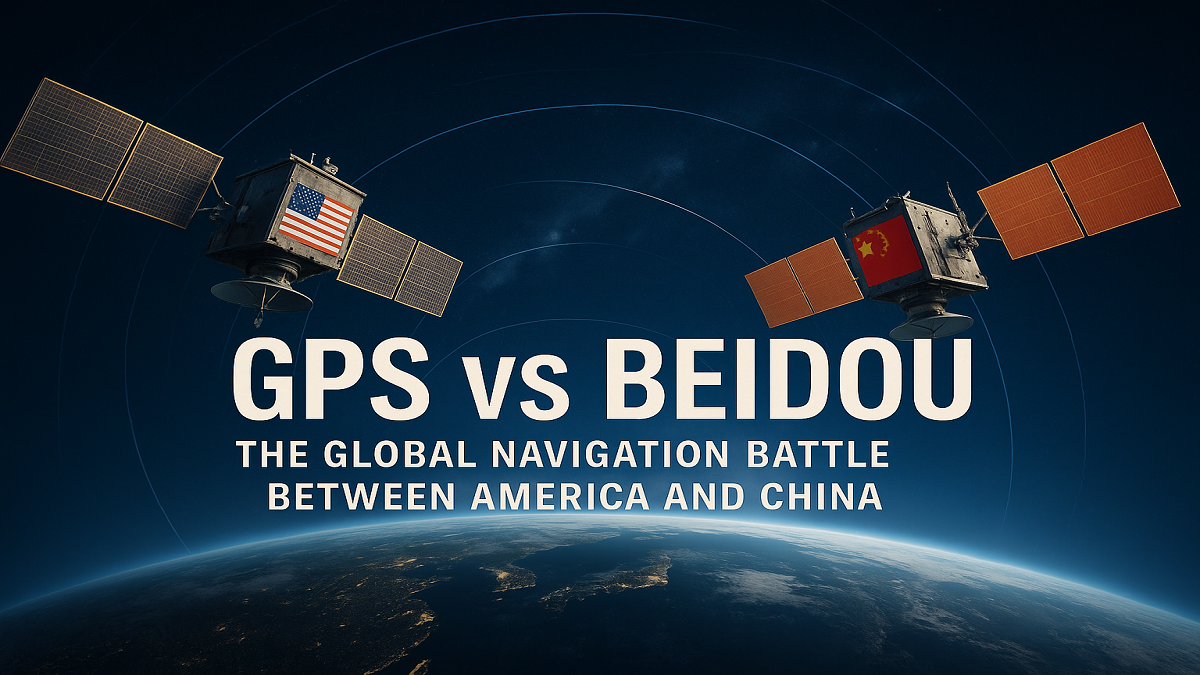In a world increasingly reliant on precise location data, the battle for supremacy in global navigation satellite systems (GNSS) has become a strategic frontier. At the heart of this rivalry stand two technological powerhouses: the United States’ Global Positioning System (GPS) and China’s BeiDou Navigation Satellite System (BDS). More than just tools for maps and smartphones, these systems are critical for military operations, national infrastructure, financial systems, and global logistics.
This article explores the competition between GPS and BeiDou, examining their technical capabilities, strategic importance, and their roles in the broader geopolitical landscape.
1. Historical Background and Development
GPS: The Original Global Standard
The Global Positioning System (GPS) was developed by the U.S. Department of Defense in the 1970s and became fully operational in 1995. Originally created for military navigation, GPS was later opened to civilian use, becoming the de facto standard for global satellite navigation.
With 31 operational satellites in medium Earth orbit (MEO), GPS provides worldwide coverage and supports a wide range of applications including aviation, maritime, smartphones, autonomous vehicles, and financial transactions.
BeiDou: China’s Strategic Response
The BeiDou Navigation Satellite System (BDS) is China’s answer to GPS. Launched in stages, its development reflects China’s pursuit of technological sovereignty and reduced reliance on Western infrastructure. The final phase of BeiDou-3 was completed in June 2020, establishing a fully global system with 35 satellites.
BeiDou is more than a navigation tool—it’s a cornerstone of China’s digital silk road, enabling Beijing to offer GNSS services across Asia, Africa, and Latin America as part of the Belt and Road Initiative (BRI).
2. Technical Comparison: GPS vs BeiDou
Satellite Constellation and Coverage
- GPS operates a constellation of 31 satellites in 6 orbital planes at an altitude of ~20,200 km.
- BeiDou uses 35 satellites, including MEO, IGSO (Inclined Geosynchronous Orbit), and GEO (Geostationary Orbit), providing regional strength and global coverage.
Positioning Accuracy
- GPS typically offers civilian positioning accuracy of around 3–5 meters and military-grade accuracy down to centimeters, especially when combined with augmentation systems.
- BeiDou claims similar or slightly better accuracy, with 1–2 meters for civilians and decimeter-level precision with ground augmentation in certain regions.
Unique Features
- GPS supports L1, L2, and L5 frequencies, enabling dual-frequency use for enhanced accuracy and anti-jamming capabilities.
- BeiDou features short message communication (SMC) — a unique capability that allows users to send text messages even in remote areas, a function not offered by GPS.
3. Strategic Significance
GPS: Global Trust and Military Backbone
GPS is integrated into the critical infrastructure of more than 100 countries and underpins everything from air traffic control to financial time-stamping. The U.S. military and NATO rely heavily on it for precision-guided munitions, drone navigation, and troop movements.
However, GPS is controlled by the U.S. government, and access can be restricted or degraded during conflicts—something that has concerned many nations.
BeiDou: China’s Push for Technological Autonomy
BeiDou is not only a technological milestone but also a strategic tool for China. It reduces China’s dependence on GPS and offers allied countries an alternative, especially in regions where Beijing seeks influence.
Countries involved in the Belt and Road Initiative are encouraged to adopt BeiDou-compatible infrastructure, expanding China’s soft power and digital influence.
4. Global Adoption and Commercial Applications
GPS: Ubiquity and Interoperability
GPS is built into nearly all smartphones, car navigation systems, and IoT devices worldwide. Its early start and universal compatibility give it a strong advantage in the commercial and consumer sectors.
Moreover, GPS is interoperable with other GNSS systems like Europe’s Galileo, Russia’s GLONASS, and Japan’s QZSS, enhancing redundancy and precision.
BeiDou: Growing Adoption and Regional Leadership
BeiDou is gaining ground, especially in Asia-Pacific, Africa, and parts of Latin America. Many Chinese smartphones (Huawei, Xiaomi) are BeiDou-compatible, and China mandates the use of BeiDou in public transportation, fisheries, and agriculture.
China has also made BeiDou-based services open-source, promoting its use in logistics, precision farming, and disaster management in developing nations.
5. Security and Geopolitical Dimensions
GPS: Trusted but Politically Contingent
While GPS is trusted for its technical reliability, its operation by the U.S. military raises concerns in countries wary of American surveillance or strategic control. In past conflicts, access to GPS has been selectively degraded.
This has pushed many nations to seek multi-GNSS compatibility, ensuring access to at least one alternative system during crises.
BeiDou: Opportunity and Concern
BeiDou is hailed by China as a symbol of technological independence, but also raises security concerns, especially in the West, over data collection, surveillance, and potential military applications.
There are worries that adoption of BeiDou infrastructure in allied nations could open the door to Chinese cyber influence or data dependency.
6. Future Outlook: Coexistence or Competition?
As the digital era deepens, GNSS infrastructure will become even more essential for autonomous vehicles, drone fleets, supply chains, and emergency services.
- GPS will continue to evolve with new satellites (GPS III/IIIF) and interoperability features.
- BeiDou is expected to improve in accuracy, expand global services, and increase commercial competitiveness.
While coexistence among GNSS systems is technically possible and already in practice, the underlying geopolitical rivalry between the U.S. and China may harden into a digital divide—especially if countries are pressured to choose sides.



 Made in India: Nadda Launches Indigenous...
Made in India: Nadda Launches Indigenous...
 Reliance Announces ₹10 Trillion AI Inves...
Reliance Announces ₹10 Trillion AI Inves...
 GalaxEye’s AI-Powered OptoSAR Satellite ...
GalaxEye’s AI-Powered OptoSAR Satellite ...








